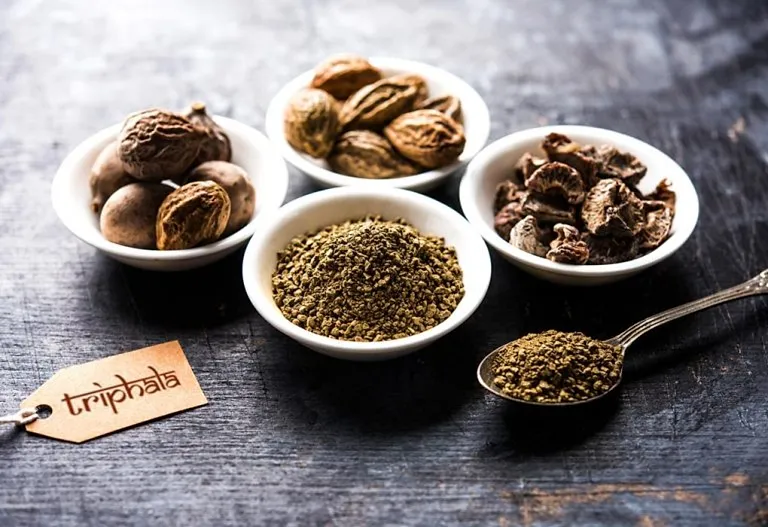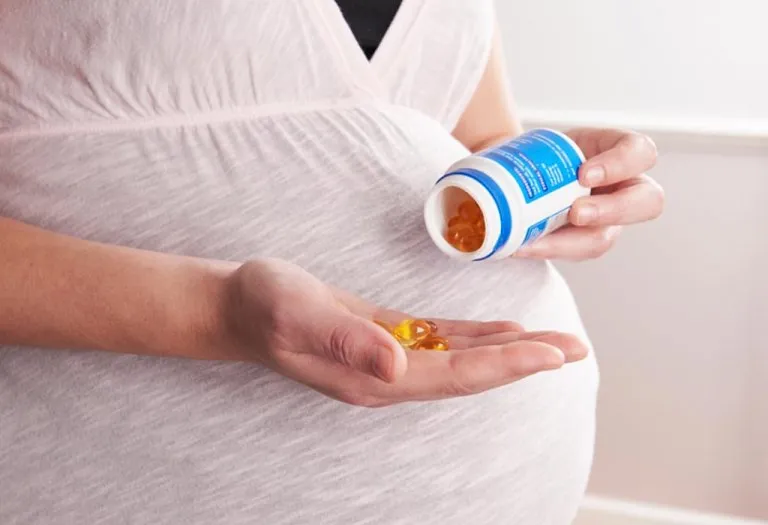Eating Fish During Pregnancy – Safe or Unsafe?

- Can You Eat Fish While Pregnant?
- Mercury in Fish
- How Much Fish Should You Eat When Pregnant?
- Risks of Consuming Excessive Mercury During Pregnancy
- What to Do if You’ve Eaten High Mercury Fish?
- Health Benefits of Eating Fish During Pregnancy
- Fish You Can Eat During Pregnancy
- Fish You Should Avoid When Pregnant
- Ways to Include Fish in Your Pregnancy Diet
- Are There Alternatives for Fish, to Get the Omega-3s?
- Tips to Prepare Fish Properly
- FAQs
You may read conflicting reports about eating fish during pregnancy which would create confusion about whether or not it is safe. However, fish and pregnancy go hand in hand, as fish can offer essential nutrients for the health of both the mother and the developing baby. In this article, we shall discuss all the possible aspects of eating fish during pregnancy and try to answer as many questions as possible. Read on to know more.
Can You Eat Fish While Pregnant?
This is a question that worries the majority of pregnant women. The answer is fairly straightforward – Yes, you should! But, you will need to choose the fish carefully and limit your portions too. A pregnant woman eating fish should prioritise options low in mercury. Your baby needs a range of nutrients essential for his early development and fish provides many of these nutrients in abundance.
Fish has low levels of saturated fat but high levels of nutrients, such as Vitamin D and protein, which are necessary for the developing baby. Fish also helps promote a healthy pregnancy. Your medical practitioner will also encourage eating fish, especially during the first trimester of the pregnancy. Moreover, fish has two essential Omega-3 fatty acids, namely EPA and DHA, which are difficult to find in other foods but essential for the baby’s development. Hence, fish is considered a welcome addition to your diet during pregnancy.
But first, let’s discuss some common concerns before you get going to the market to get some fish!
Mercury in Fish
Mercury is not only found in water but also in the air that we breathe. However, due to rapid industrialisation, more mercury is being released into the air by chemical industries, power plants, cement plants and manufacturing companies. Items of daily use like thermometers, fluorescent lights, thermostats, etc., also contain mercury and pollute the water when they are disposed of unchecked in rivers and seas. Bacteria convert the mercury settled in water into methyl-mercury. When fish swim in these waters and feast on other organisms, mercury enters their system and remains in their muscles. The most worrying fact is that it remains in the muscles even after cooking the fish.
Fish are a storehouse of many vital nutrients which a pregnant woman needs to foster a healthy fetus. However, many toxins and pollutants from the water bodies find their way into the fish that we eat and these fish, when ingested, can affect human health. Although small amounts of mercury may not have a major impact on our health, studies have shown that the neurological development of babies can be severely affected if the mercury levels remain high and unchecked. As a mother-to-be, you would want to eliminate the risk of mercury in pregnancy and therefore, it is best to stick to low-mercury fish during this period, which we shall talk about in the article below.
Now, let’s take a look at the quantity of fish you can eat because, like any other foods, eating fish in excess also has consequences.
How Much Fish Should You Eat When Pregnant?
International agencies like FDA (Food and Drug Administration) and EPA (Environmental Protection Agency) recommend two or three servings, i.e., 8 to 12 ounces (226 to 340 grams), of low-mercury fish every week (9). Breastfeeding mothers should also follow the same instructions to give their babies the necessary nutrients.
Consuming fish in excessive quantities can lead to severe developmental risks in the fetus. And, as a mother-to-be, you must know about the potential dangers eating fish has. Let’s also take a look at what you could do in case you consume high-mercury fish accidentally.
Risks of Consuming Excessive Mercury During Pregnancy
The methyl-mercury from fish is absorbed by our body upon consumption, and it moves across the placenta to the baby. Even low levels of methyl-mercury can have an impact on the baby’s brain and nervous system. Important areas like vision, language, motor skills, and cognitive skills like attention and memory may be impacted. Therefore, it is important for pregnant women to monitor the kind of fish they are eating.
What to Do if You’ve Eaten High Mercury Fish?
If you have unknowingly eaten fish that has high mercury levels, do not panic. The first step is to stop any further consumption and inform your doctor about it. Your doctor could suggest chelation therapy by administering chelating drugs to help eliminate the metal from your organs. Chelation therapy will help your body to relieve itself of mercury and reduce its effects too.
Now that you know how high-mercury fish could affect you and your baby’s health, let’s take a look at some health benefits that fish has to offer. Bear in mind that to reap these benefits, it is essential for you to consume only no-mercury or low-mercury fish.
Health Benefits of Eating Fish During Pregnancy
Including fish in pregnancy diet is recommended for its nutritional benefits. Here are some reasons why eating fish during pregnancy is an excellent idea for you and your baby:
- Fish are powerful sources of lean protein, which is an essential amino acid that supports fetal growth. It helps to create the baby’s cells for hair, bones, skin, and muscles (3).
- Fish like salmon are a great source of DHA, an Omega-3 fatty acid, which is known to boost the development of the baby’s brain (4). A good supply of Omega-3 is helpful for pregnant women to enhance their baby’s memory development and improve brain activity. Also, the baby’s growth is highly accelerated during the third trimester and it is especially important to consume fish during this duration.
- The increased intake of DHA and Omega-3 fatty acids through consumption of fish is also recommended post-pregnancy to battle mood swings and bouts of depression (2).
- If the would-be-mother suffers from hypertension, eating fish can lower blood pressure. A fish-rich diet reduces blood clotting and blood fat levels, which may lower the risk of cardiac arrest in pregnant women (1).
- Pregnant women who have a high fish intake along with adequate Omega-3, either through fish or other supplements, have lower risks of preterm birth (5).
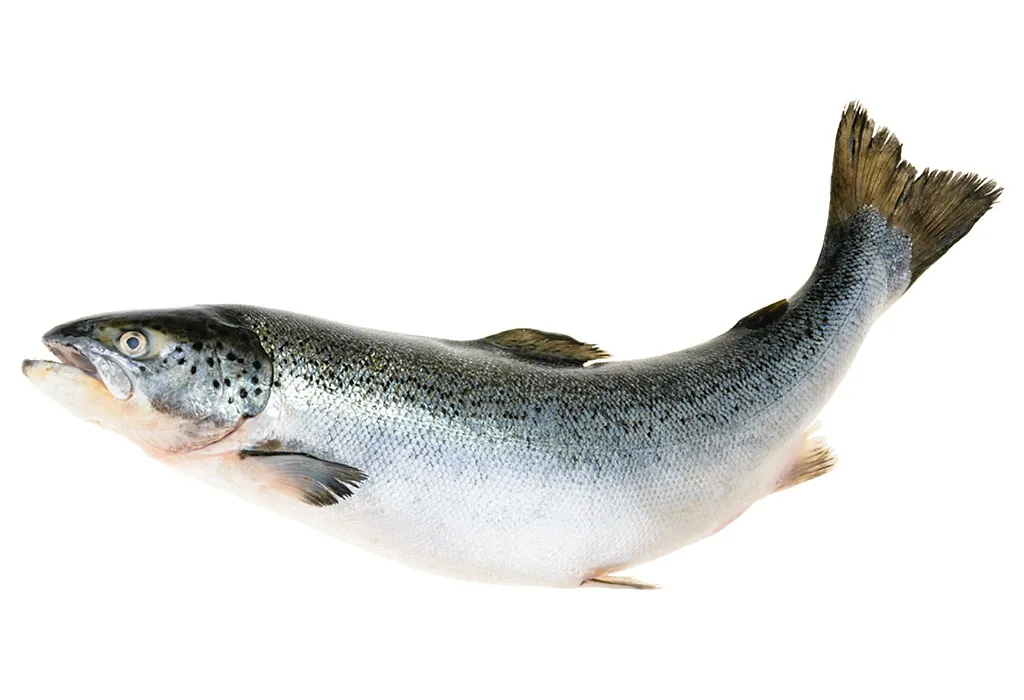
So, which fish can you eat during pregnancy or which fish should you avoid? Let’s find out!
Fish You Can Eat During Pregnancy
While eating out at restaurants or when cooking at home, you should keep in mind the list of safe fish during pregnancy. Safe fish for pregnancy include varieties low in mercury such as salmon, trout, haddock, and sardines, which provide essential nutrients like omega-3 fatty acids without posing risks to fetal development. Halibut, shrimp, and snapper should not be consumed in more than 1 serving per week (8), while the others mentioned above are considered safe to eat in 2-3 servings per week.
The serving size can vary based on the type and preparation, but a single serving of fish is usually set at 3-6 ounces (85 to 170 grams). You can stick to the quantity recommended by the FDA (Food and Drug Administration) and EPA (Environmental Protection Agency), but try to limit it or lower it slightly to reduce the risks. Also, ensure the fish is fresh and where possible ask for organically farmed fish.
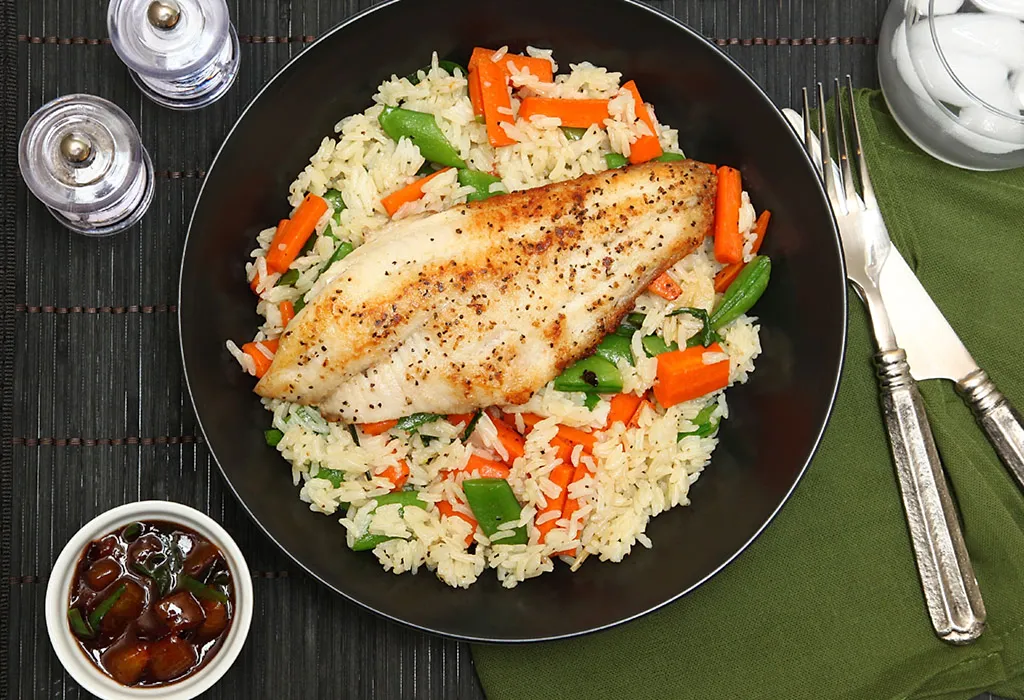
Recently, there have been conflicting reports about salmon and the high levels of PCBs (polychlorinated biphenyls) found in farmed salmon. PCBs are toxic chemicals that have also been linked to cancer. To be safe, consume wild salmon or organically-farmed salmon.
Fish You Should Avoid When Pregnant
The presence of mercury in fish is a great deterrent for fish lovers. Methyl-mercury, a neurotoxin, when consumed in high quantities, can cause damage to the nervous system. During pregnancy, fish like shark, king mackerel, swordfish and tilefish should be a complete no-no (11). You should also avoid all kinds of raw fish, including sushi, ceviche, and sashimi, as they could cause food poisoning. Similarly, refrigerated smoked fish carries the risk of Listeria (a serious bacterial infection) and should be on the list of fish to avoid during pregnancy.
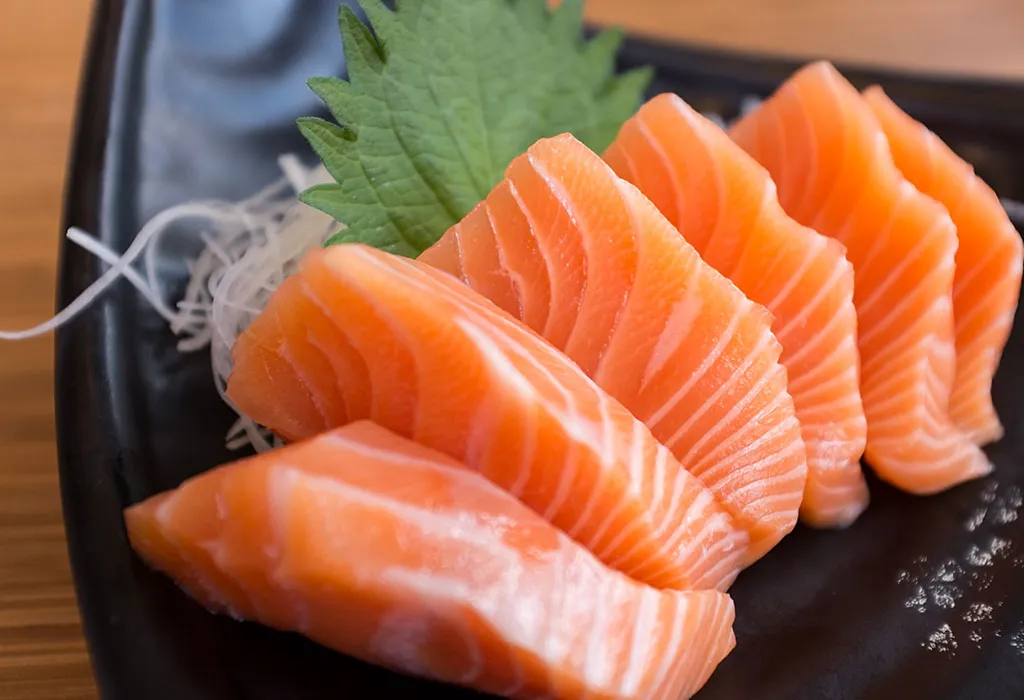
Also, avoid eating fish that has been caught recreationally and check the water information if possible before consuming it. You should remove the skin and excess fat before eating such varieties of fish.
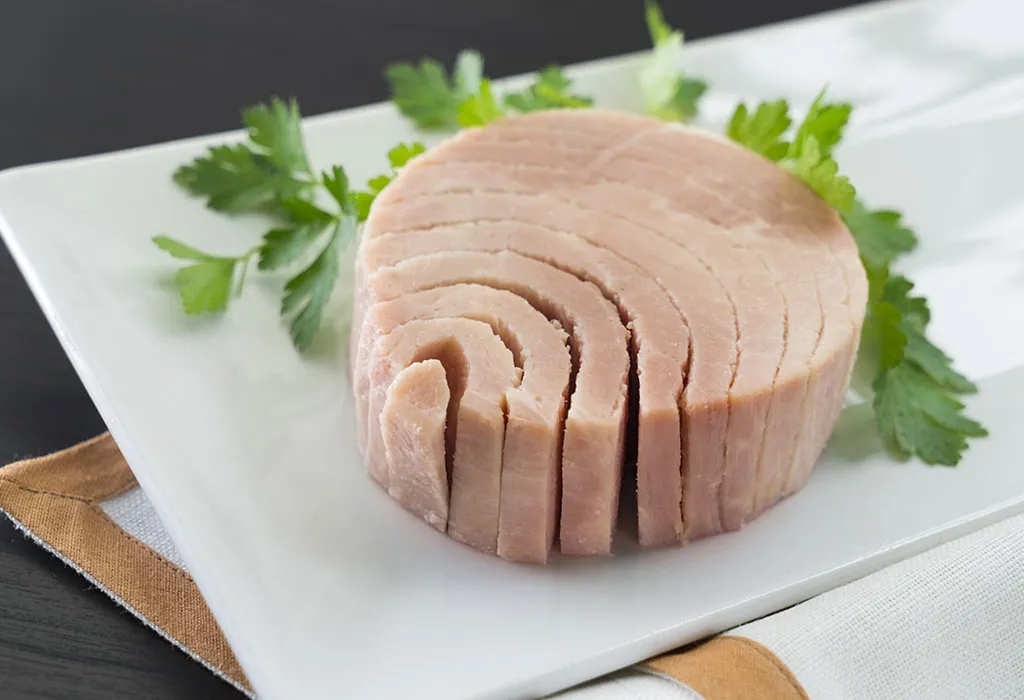
The commercial fishing industry is well regulated, and therefore, canned fish which is available at restaurants and supermarkets is usually safe for consumption during pregnancy. It is best to weigh the risks and benefits before eating any kind of fish or check with your doctor if you are worried about your baby’s health and safety.
Ways to Include Fish in Your Pregnancy Diet
Introducing fish into your pregnancy diet can be an excellent way to ensure you get essential nutrients like omega-3 fatty acids and lean protein. Here are some ways to incorporate fish into your meals during pregnancy:
1. Grilled or Baked
Grill or bake fish fillets with a light seasoning of herbs and spices. This cooking method retains the fish’s natural flavours without adding excess oil or unhealthy fats, making it a nutritious choice for expecting mothers.
2. Fish Tacos or Wraps
Use grilled or baked fish to create delicious fish tacos or wraps. Load them with fresh vegetables like lettuce, tomatoes, and avocado for added nutrients and flavour. Use whole-grain tortillas or wraps for extra fibre, which is beneficial during pregnancy.
3. Fish Salads
Prepare a nutritious salad featuring flaked fish on a bed of leafy greens, such as spinach or kale. Add colourful vegetables, nuts, and seeds for texture and nutrients. For a flavourful and satisfying meal option, consider drizzling with a homemade vinaigrette made with healthy oils like olive oil.
Are There Alternatives for Fish, to Get the Omega-3s?
If you are amongst the people who do not consume fish for taste or religious reasons and therefore worry about the intake of omega-3 fatty acids during pregnancy, you need not worry. Apart from fish and fish oils, you can eat the following food items to compensate naturally:
- Walnuts are a rich source of Omega-3 fatty acids, and a handful of walnuts is great as an afternoon snack during pregnancy.

- Use olive oil while cooking food, especially for stir-fried or sautéed dishes, to balance your intake of Omega-3 fatty acids. However, do not overuse it since it is a calorie-rich oil.
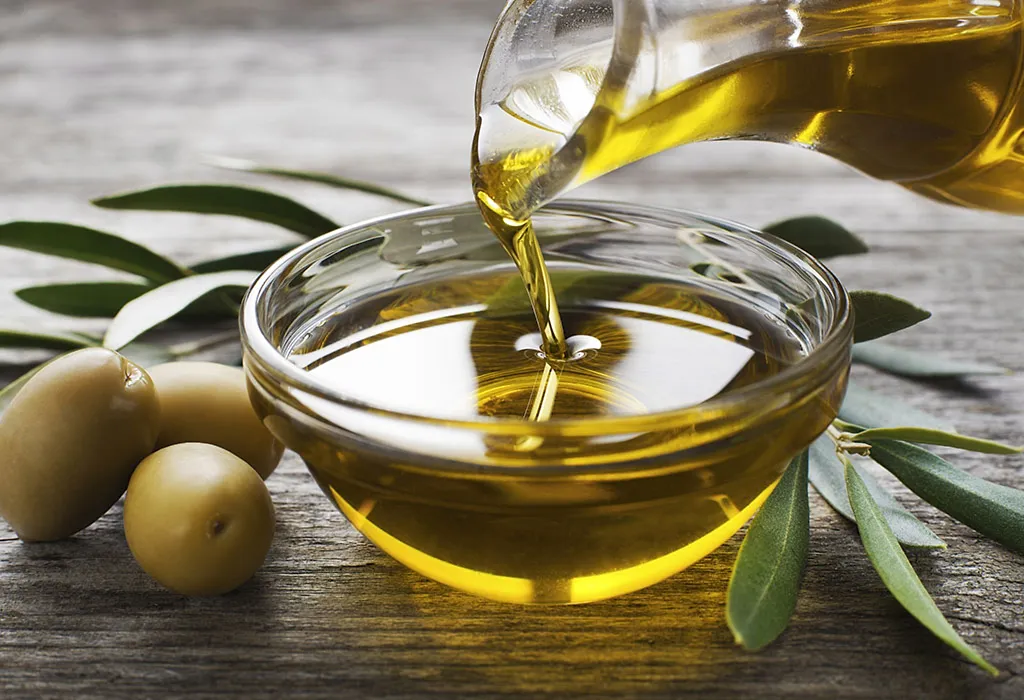
- Flax seeds are another valuable source of Omega-3s. Crushed flax seeds can be added to yoghurt or oats while having breakfast or an evening meal.
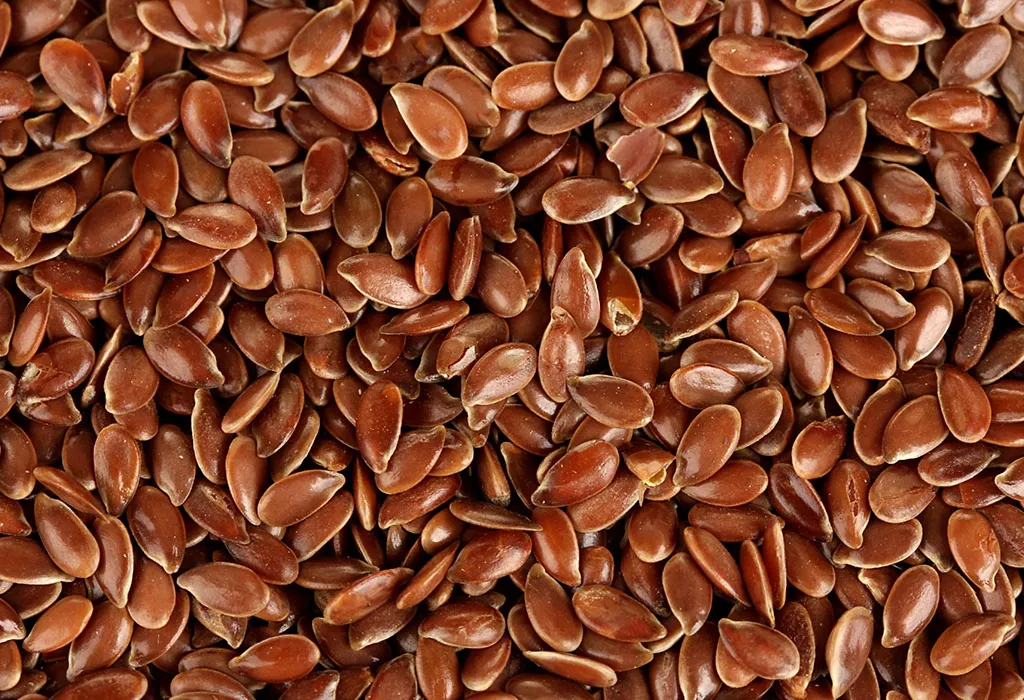
- Hemp seeds are rich in omega-3 fatty acids and can be easily incorporated into your diet. Sprinkle them over salads, yogurt, or oatmeal, or blend them into smoothies for a nutritious boost.
For those who can eat fish, here are some useful tips to ensure they eat safe and nutrient-rich fish.
Tips to Prepare Fish Properly
Cooking fish in the right manner helps in reducing the consumption of potential contaminants that could cause harm to you or your baby. Here are a few tips to prepare fish delicacies in a nutritious and tasty way:
- All seafood, including shrimps, lobsters, and oysters should be cooked until they reach an internal temperature of 75°C to eliminate any contaminants (7).
- Oysters, clams, and mussels are cooked perfectly if their shells open. If not, do not consume them.
- Buying fresh, well-refrigerated seafood is always advised. Seal the fish in an airtight container and refrigerate it if you do not plan to use it immediately.
- Use different cutting boards for veggies and meat & fish for hygiene purposes.
- Raw food should be completely avoided as there is a higher possibility of contamination. Keep sushi and other raw fish out of your kitchen for a while, at least during pregnancy (10).
FAQs
1. Is canned tuna safe to eat during pregnancy?
Canned tuna is termed as a high-risk fish. However, it can be eaten by pregnant women if it is not their main or only source of food, and the quantity is limited. An occasional serving of tuna will not cause harm to your baby. However, avoid albacore tuna (also known as white tuna) since it is known to have higher quantities of mercury. Prefer light tuna over its other varieties.
2. Can you eat fish caught in local waters?
Fish that are caught in local waters has been flagged unsafe. This is because the contamination of rivers and seas has grown with time and industries are known to release untreated chemicals into them. During pregnancy, it is best to avoid fish caught at places where there is little or no monitoring of the extent of mercury contamination (6).
3. How can pregnant women ensure that the fish they consume is fresh and safe?
Pregnant women should purchase fish from reputable sources and ensure it is properly stored and refrigerated. Fresh fish should have a mild odour and firm, shiny flesh. If buying frozen fish, ensure it is properly thawed in the refrigerator before cooking.
4. Can eating fish during pregnancy help with fetal development?
Yes, consuming fish during pregnancy can aid in fetal development due to its high content of omega-3 fatty acids, which are crucial for brain and eye development in the growing fetus.
When considering a diet during pregnancy, it’s crucial to focus on fish safe for pregnant women, such as salmon and tilapia, to ensure optimal health for both the mother and the baby. It is best to eat recommended portions of fresh fish cooked to perfection during pregnancy without overdoing it. Speak to your doctor and check if it is okay to eat certain fish in your condition. Remember, you and your baby need various nutrients at this time and fish can certainly provide them in abundance, as long as the necessary caution is observed.
References/Resources:
1. Omega-3 Fatty Acids and Coronary Heart Disease; University of Rochester Medical Center;
https://www.urmc.rochester.edu/encyclopedia/content.aspx?contenttypeid=1&contentid=3054
2. Borazjani. F, Angali. K. A, Kulkarni. S. S; Milk and Protein Intake by Pregnant Women Affects Growth of Foetus; Journal of Health, Population and Nutrition; https://www.ncbi.nlm.nih.gov/pmc/articles/PMC3905637/
3. PREGNANT? EAT MORE FISH BUT PROCEED WITH CAUTION; University of Utah Health; https://healthcare.utah.edu/healthfeed/2014/06/pregnant-eat-more-fish-proceed-caution; June 2014
4. Preterm Birth: Causes, Consequences, and Prevention; The National Academies of Sciences Engineering Medicine; https://nap.nationalacademies.org/read/11622/chapter/6#89
5. Should I Eat the Fish I Catch; United States Environmental Protection Agency; https://sites.nicholas.duke.edu/superfund/files/2017/02/EPA_Should_I_Eat_Fish_I_Catch_english_updated_fishbrochure.pdf; October 2014
6. Chen. X; Is it done yet? A guide to safely cooking meat; Michigan State University Extension; https://www.canr.msu.edu/news/is_it_done_yet_a_guide_to_safely_cooking_meat; August 2015
7. Fish & Pregnancy: What is Safe to Eat?; American Academy of Pediatrics; https://www.healthychildren.org/English/ages-stages/prenatal/Pages/Fish-Pregnancy-What-is-Safe-to-Eat.aspx
8. EPA-FDA Advice about Eating Fish and Shellfish; EPA; https://www.epa.gov/choose-fish-and-shellfish-wisely/epa-fda-advice-about-eating-fish-and-shellfish
9. Foods to avoid or limit during pregnancy; March of Dimes; https://www.marchofdimes.org/find-support/topics/pregnancy/foods-to-avoid-or-limit-during-pregnancy
Also Read:
Sardines in Pregnancy
Salmon Fish during Pregnancy
Eating Flounder during Pregnancy
Consuming Sea Bass while Pregnant
Was This Article Helpful?
Parenting is a huge responsibility, for you as a caregiver, but also for us as a parenting content platform. We understand that and take our responsibility of creating credible content seriously. FirstCry Parenting articles are written and published only after extensive research using factually sound references to deliver quality content that is accurate, validated by experts, and completely reliable. To understand how we go about creating content that is credible, read our editorial policy here.










